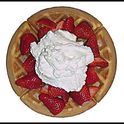How do you render pork fat from trimmings?
4 Comments
ChefOnoApril 5, 2012
More:
If you notice any sticking, stir more often or reduce the heat. The lower the heat, the higher the quality of the finished product.
The lard will remain around 212° at first but, as water boils off, the temperature will rise. When it climbs above 255°, turn off the heat and let the lard settle and cool slightly. The liquid will be a golden color but it will turn white when it solidifies. Strain the lard through several layers of cheesecloth and cool it quickly for a smooth, fine texture.
As HalfPint mentioned, the cracklings can be a bonus. Drain, salt and eat as a snack or use like bacon bits to season eggs and vegetables. Cracklin’ Cornbread used to be a favorite country recipe, back before we lost touch with this important part of our culinary history.
If you notice any sticking, stir more often or reduce the heat. The lower the heat, the higher the quality of the finished product.
The lard will remain around 212° at first but, as water boils off, the temperature will rise. When it climbs above 255°, turn off the heat and let the lard settle and cool slightly. The liquid will be a golden color but it will turn white when it solidifies. Strain the lard through several layers of cheesecloth and cool it quickly for a smooth, fine texture.
As HalfPint mentioned, the cracklings can be a bonus. Drain, salt and eat as a snack or use like bacon bits to season eggs and vegetables. Cracklin’ Cornbread used to be a favorite country recipe, back before we lost touch with this important part of our culinary history.
ChefOnoApril 5, 2012
I use lard regularly in baking and it's an essential part of authentic Mexican cuisine. Here are some additional tips:
Do this operation outside if you're going to be making a large batch. I can't stress this point enough. A hotplate, induction burner or a gas grill will all work for the purpose. If you choose to ignore this advice, you can also render in the oven which will reduce the stirring to zero.
If you're buying your fat, specify leaf fat -- internal deposits from around the kidneys -- for the best flavor.
Chill the fat almost to freezing before you cut it. It'll go a lot easier. Remove and discard any lean as you go.
Go slowly over gentle heat, especially at first. You don't want to burn it and the process takes time. Once there's a layer of liquid on the bottom of the pot, you can increase the heat a little. When the bubbling slows or stops, it's done.
Do this operation outside if you're going to be making a large batch. I can't stress this point enough. A hotplate, induction burner or a gas grill will all work for the purpose. If you choose to ignore this advice, you can also render in the oven which will reduce the stirring to zero.
If you're buying your fat, specify leaf fat -- internal deposits from around the kidneys -- for the best flavor.
Chill the fat almost to freezing before you cut it. It'll go a lot easier. Remove and discard any lean as you go.
Go slowly over gentle heat, especially at first. You don't want to burn it and the process takes time. Once there's a layer of liquid on the bottom of the pot, you can increase the heat a little. When the bubbling slows or stops, it's done.
HalfPintApril 5, 2012
Back in the day when my mother still used lard in her cooking, we would render lard using pork fat that was sold at the supermarket. She (we) cut the fat into small pieces about 1/2 inch or so. Smaller is better, but you don't have to be too precise. Then the fat went into a wok ( any pan or skillet will work too), and heat it (on med) until the fat started to melt. Stir it to help the rendering, but you don't need to be stirring it constantly. Other than scooping out the cracklings (which were really good in a bowl of egg noodle soup) and skim for browned bits, that's it. Pour into a glass jar (mom used an old mayonaise jar) and store in the fridge.
Showing 4 out of 4 Comments
Recommended by Food52
Popular on Food52
Continue After Advertisement

